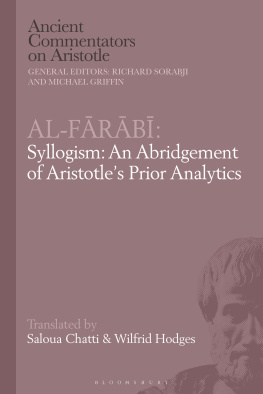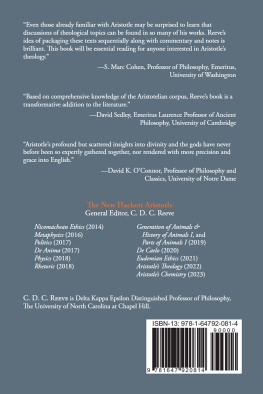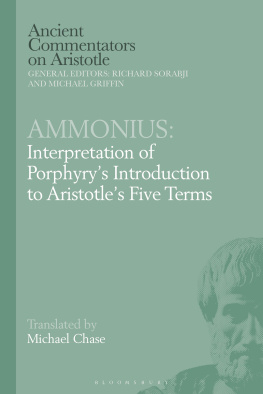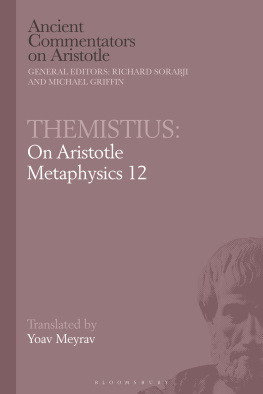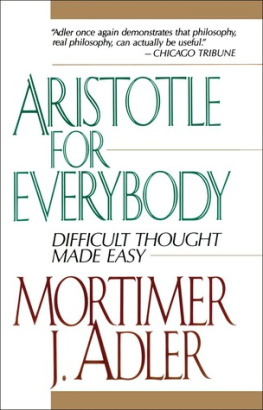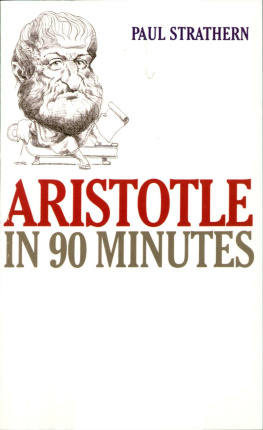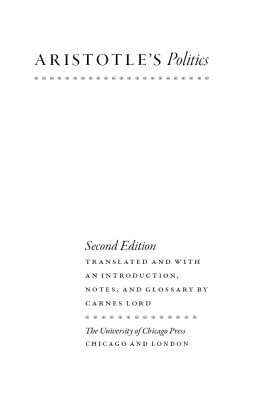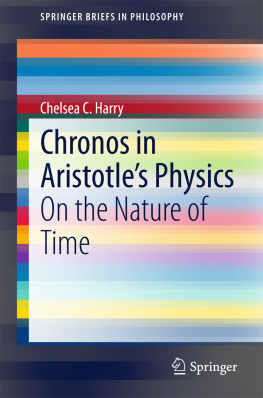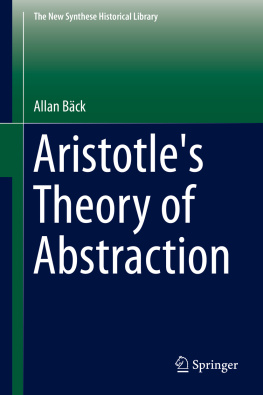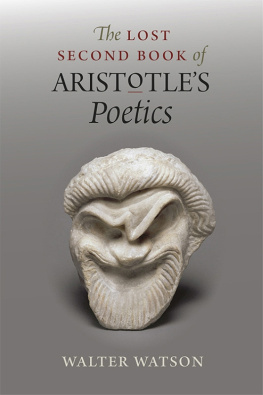
Al-Frb
Syllogism:
An Abridgement of Aristotles Prior Analytics
Ancient Commentators on Aristotle
GENERAL EDITORS: Richard Sorabji, Honorary Fellow, Wolfson College, University of Oxford, and Emeritus Professor, Kings College London, UK; and Michael Griffin, Assistant Professor, Departments of Philosophy and Classics, University of British Columbia, Canada.
This prestigious series translates the extant ancient Greek philosophical commentaries on Aristotle. Written mostly between 200 and 600 AD , the works represent the classroom teaching of the Aristotelian and Neoplatonic schools in a crucial period during which pagan and Christian thought were reacting to each other. The translation in each volume is accompanied by an introduction, comprehensive commentary notes, bibliography, glossary of translated terms and a subject index. Making these key philosophical works accessible to the modern scholar, this series fills an important gap in the history of European thought.
A webpage for the Ancient Commentators Project is maintained at ancientcommentators.org.uk and readers are encouraged to consult the site for details about the series as well as for addenda and corrigenda to published volumes.

Acknowledgements
The present translations have been made possible by generous and imaginative funding from the following sources: the National Endowment for the Humanities, Divison of Research Programs, an independent federal agency of the USA; the Leverhulme Trust; the British Academy; the BA/Leverhulme Small Research Grant; the Jowett Copyright Trustees; the Royal Society (UK); Centro Internazionale A. Beltrame di Storia dello Spazio e del Tempo (Padua); Mario Mignucci; Liverpool University; the Leventis Foundation; the Arts and Humanities Research Council; Gresham College; the Esme Fairbairn Charitable Trust; the Henry Brown Trust; Mr and Mrs N. Egon; the Netherlands Organisation for Scientific Research (NOW/GW); the Ashdown Trust; the Lorne Thyssen Research Fund for Ancient World Topics at Wolfson College, Oxford; Dr Victoria Solomonides, the Cultural Attach of the Greek Embassy in London; and the Social Sciences and Humanities Research Council of Canada. The editors wish to thank Dawn Sellars for preparing the volume for press; and Alice Wright, Publisher, along with Georgina Leighton at Bloomsbury Academic, for their diligence in seeing each volume of the series to press.
To the memory of Bchir
Saloua Chatti
To Helen with thanks for all the flowers
Wilfrid Hodges
Contents
Richard Sorabji
Readers of our translations from Greek will wish to know how the text translated here from the later Arabic of al-Frb relates to the more familiar Greek commentaries on successive passages of Aristotle. Even though al-Frb also wrote long commentaries of the type more familiar in Greek, this text of his is instead a loose abridgement of the contents of Aristotles Prior Analytics on syllogism and other forms of argument. It too is a continuous abridgement, rather than a commentary on successive passages of Aristotle, and the translators compare it from time to time with al-Frb. I believe we can identify the post-Ammonian class that Paul attended in Alexandria and on which he drew for part of his text, although I shall leave the argument for that to another time. The point relevant for now is that a sixth-century student of commentary on Aristotle could already write an abridgement of Aristotles logic, as opposed to a commentary on successive passages of Aristotles text.
The translators lucid introduction to al-Frbs text rightly takes a different form from the annotation and notes supplied in our standard translations of commentaries on Aristotle, because those commentaries supply or presuppose extracts from Aristotle himself which call for the translators comments on those extracts, whereas here what needs elucidating is the abridgement of Aristotles doctrine.
Note
This book is divided into chapters which in turn are sometimes divided into sections and then into subsections. Displayed text is referenced on the lefthand side, for example (1.2.3) is the third displayed text in the second section of Chapter 1.
Al-Frbs book Syllogism is divided into parts which are subdivided into paragraphs; for example paragraph 10.3 is the third paragraph in Part 10. Below that level it is referenced by pages and lines. Thus [66] 36,57 is lines 5 to 7 on page 36 of the edition [66] of Syllogism. The labelling by pages and lines is shown in the margin of the translation. We use a similar style for referring to pages and lines of other classical or medieval texts. A reference such as 36,57 with no book mentioned is a reference to Syllogism.
The division of al-Frbs text into parts is given by al-Frb himself in his introduction, for Parts 1 to 18. The labelling of Parts 19 and 20 is modern, and the subdivision of Part 18 into 18a18d is our own.
In the translation, square brackets [] enclose words or phrases that have been added to the translation for purposes of clarity. Round brackets (), besides being used for ordinary parentheses, contain transliterated Arabic words.
We thank Sir Richard Sorabji for his invitation to write this volume, and for his steady interest, encouragement and suggestions. We also thank Dawn Sellars for her very thorough and helpful advice on editorial matters. We have benefitted from discussions with many people, including Rosabel Ansari, Nacra Bensaou, Susanne Bobzien, Michael Carter, Besma Nouha Chaouch, Greg Cherlin, Thrse-Anne Druart, Asadollah Fallahi, Manuela E. B. Giolfo, Ahmad Hasnawi, Daniel King, Joep Lameer, John P. McCaskey, Mokdad Arfa Mensia, Seyed N. Mousavian, Jamal Ouhalla, Riccardo Strobino, Jalila Tritar. Of course none of these people should be blamed for any of our mistakes or misjudgements.
Wilfrid Hodges
We begin our discussion of al-Frbs book Syllogism [66] with a short description of Aristotles theory of syllogisms as al-Frb will have known it from the Arabic sources available to him.
1.1 Categorical sentences
There are four main kinds of quantified categorical sentence, as in the following examples:
Universal affirmative Every human is an animal.
Universal negative No human is a horse.
Particular affirmative Some animal is a human.
Particular negative Some animal is not a horse. Or, Not every animal is a horse.
These sentences all happen to be true, but of course there are false categorical sentences too, like Every human is a horse.
The noun immediately after the quantifier expression Every, No, Some or Not every is known as the subject, and the noun at the end of the sentence is known as the predicate. In the examples above, the subject comes before the predicate, or as we will say, the sentences are written in SP ordering. But al-Frb was aware that some logicians wrote the sentences in PS ordering, i.e. with predicate before subject. The PS ordering is almost as artificial in Arabic as it is in English. Al-Frb illustrates it with sentences that we translate as:
Animal is true of every human.
Animal holds of every human.
Animal is in every human.
There are similar examples for the other categorical forms. As PS versions of Not every animal is a horse al-Frb writes sentences that we translate as
Next page
